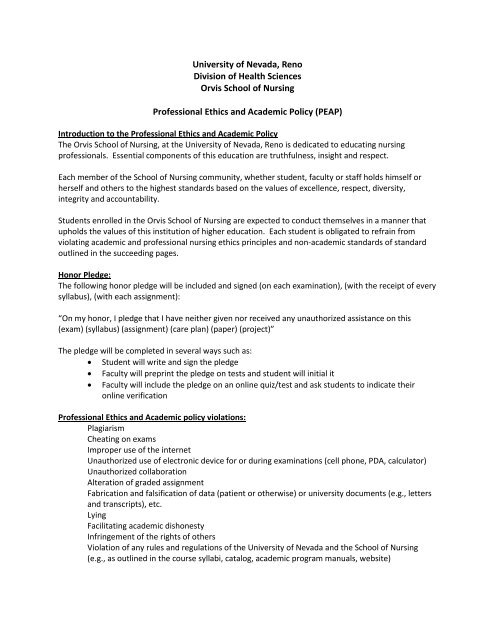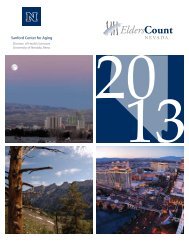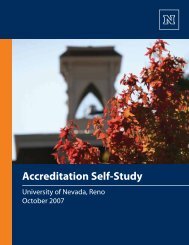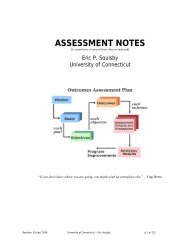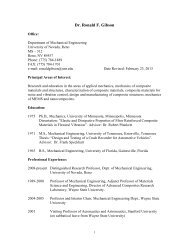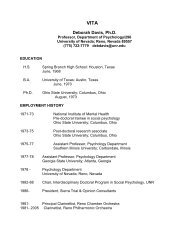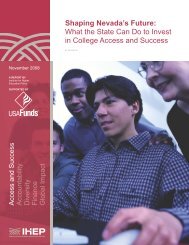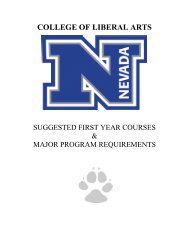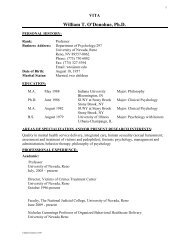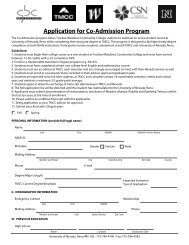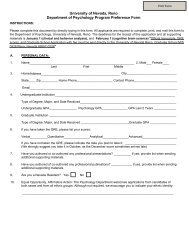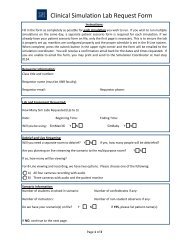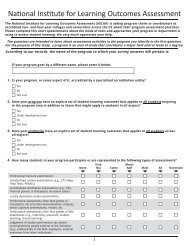PEAP - University of Nevada, Reno
PEAP - University of Nevada, Reno
PEAP - University of Nevada, Reno
Create successful ePaper yourself
Turn your PDF publications into a flip-book with our unique Google optimized e-Paper software.
<strong>University</strong> <strong>of</strong> <strong>Nevada</strong>, <strong>Reno</strong><br />
Division <strong>of</strong> Health Sciences<br />
Orvis School <strong>of</strong> Nursing<br />
Pr<strong>of</strong>essional Ethics and Academic Policy (<strong>PEAP</strong>)<br />
Introduction to the Pr<strong>of</strong>essional Ethics and Academic Policy<br />
The Orvis School <strong>of</strong> Nursing, at the <strong>University</strong> <strong>of</strong> <strong>Nevada</strong>, <strong>Reno</strong> is dedicated to educating nursing<br />
pr<strong>of</strong>essionals. Essential components <strong>of</strong> this education are truthfulness, insight and respect.<br />
Each member <strong>of</strong> the School <strong>of</strong> Nursing community, whether student, faculty or staff holds himself or<br />
herself and others to the highest standards based on the values <strong>of</strong> excellence, respect, diversity,<br />
integrity and accountability.<br />
Students enrolled in the Orvis School <strong>of</strong> Nursing are expected to conduct themselves in a manner that<br />
upholds the values <strong>of</strong> this institution <strong>of</strong> higher education. Each student is obligated to refrain from<br />
violating academic and pr<strong>of</strong>essional nursing ethics principles and non-academic standards <strong>of</strong> standard<br />
outlined in the succeeding pages.<br />
Honor Pledge:<br />
The following honor pledge will be included and signed (on each examination), (with the receipt <strong>of</strong> every<br />
syllabus), (with each assignment):<br />
“On my honor, I pledge that I have neither given nor received any unauthorized assistance on this<br />
(exam) (syllabus) (assignment) (care plan) (paper) (project)”<br />
The pledge will be completed in several ways such as:<br />
• Student will write and sign the pledge<br />
• Faculty will preprint the pledge on tests and student will initial it<br />
• Faculty will include the pledge on an online quiz/test and ask students to indicate their<br />
online verification<br />
Plagiarism<br />
Pr<strong>of</strong>essional Ethics and Academic policy violations:<br />
Cheating on exams<br />
Improper use <strong>of</strong> the internet<br />
Unauthorized use <strong>of</strong> electronic device for or during examinations (cell phone, PDA, calculator)<br />
Unauthorized collaboration<br />
Alteration <strong>of</strong> graded assignment<br />
Fabrication and falsification <strong>of</strong> data (patient or otherwise) or university documents (e.g., letters<br />
and transcripts), etc.<br />
Lying<br />
Facilitating academic dishonesty<br />
Infringement <strong>of</strong> the rights <strong>of</strong> others<br />
Violation <strong>of</strong> any rules and regulations <strong>of</strong> the <strong>University</strong> <strong>of</strong> <strong>Nevada</strong> and the School <strong>of</strong> Nursing<br />
(e.g., as outlined in the course syllabi, catalog, academic program manuals, website)
Definitions<br />
Plagiarism<br />
Submission <strong>of</strong> the same or substantially similar work <strong>of</strong> another person, such as an author or classmate<br />
Improper documentation <strong>of</strong> quotations, words, ideas, or paraphrased passages taken from published or<br />
unpublished sources<br />
Use <strong>of</strong> the results <strong>of</strong> another student’s work (e.g., exam, papers, lab data, nursing care plan or other<br />
patient evaluation documentation) while representing it as one’s own<br />
Unauthorized submission <strong>of</strong> a paper as original work in one course when the paper has received credit<br />
in another course<br />
Cheating on Examinations<br />
Use <strong>of</strong> unauthorized materials (e.g., devices, notes, books) during an in-class, WEB-CT or take-home<br />
examination.<br />
Consultation <strong>of</strong> unauthorized materials while being excused (e.g., on a bathroom break) from an<br />
examination room<br />
Copying answers from another student or allowing another student to copy your answers<br />
Unauthorized discussion <strong>of</strong> an exam’s content during its administration<br />
Obtaining an examination or answers to an examination prior to its administration<br />
Studying from an old exam whose circulation was prohibited by the instructor<br />
Failing to comply with designated time limits for an academic evaluation without authorization<br />
Acting as a substitute for another or utilizing another as a substitute during an academic evaluation <strong>of</strong><br />
any type<br />
Improper use <strong>of</strong> Internet<br />
Plagiarism from a published or unpublished Internet source<br />
Improper or lack <strong>of</strong> documentation <strong>of</strong> an Internet source<br />
Use <strong>of</strong> paper writing services or paper databases on the Internet<br />
Posting <strong>of</strong> patient/client data or photographs<br />
Unauthorized Use <strong>of</strong> Electronic Devices<br />
Consultation <strong>of</strong> unauthorized electronic devices (e.g., calculators, cellular phones, PDAs, computers)<br />
during examinations
Use <strong>of</strong> electronic devices to communicate within or outside an examination room (e.g., use <strong>of</strong> cellular<br />
phones is not permitted during an exam)<br />
Storage <strong>of</strong> test answers, class notes and other references in electronic devices for use during<br />
examination<br />
Improper use during examination <strong>of</strong> email, text paging, beaming, and instant messaging<br />
Transmittal <strong>of</strong> patient/client data or photographs<br />
Unauthorized Collaboration<br />
Collaboration on homework assignments, papers, reports unless explicitly assigned or approved by<br />
faculty<br />
Alteration <strong>of</strong> Graded Assignments<br />
Submission <strong>of</strong> an examination or assignment for regarding after making changes to the original answers<br />
on test<br />
Forgery and Falsification<br />
Falsification or invention <strong>of</strong> data in such things as laboratory experiments, data analysis, patient<br />
evaluation<br />
Citation <strong>of</strong> nonexistent sources or creation <strong>of</strong> false information in an assignment<br />
Attributing to a source ideas or information not included in the source<br />
Forgery <strong>of</strong> university documents, such as academic transcripts and letters <strong>of</strong> reference<br />
Lying<br />
Request for special consideration from faculty or university <strong>of</strong>ficials based upon false information or<br />
deception<br />
Fabrication <strong>of</strong> a medical or emergency excuse as a reason for needing an extension on an assignment or<br />
for missing an examination or clinical<br />
Claiming falsely to have completed and/or turned in an assignment<br />
Falsely reporting an ethics violation by another student<br />
Facilitating Academic Dishonesty<br />
Intentionally or knowingly aiding another student to commit a violation <strong>of</strong> academic conduct<br />
Allowing another student to copy from one’s examination paper during administration <strong>of</strong> the exam, or<br />
another student’s work <strong>of</strong> any kind.<br />
Providing copies <strong>of</strong> course material whose circulation was prohibited (e.g., exams or assignments) to<br />
students enrolled in or planning to take that course
Taking an examination or completing an assignment for another, or permitting one to do so<br />
Unfair Competition<br />
Willfully damaging the academic efforts <strong>of</strong> other students<br />
Stealing another student’s academic materials (e.g., book, notes, assignment, computer disks, etc.)<br />
Denying another student needed resources such as hiding library materials or stealing lab equipment<br />
Infringement on the Rights <strong>of</strong> Others<br />
Using behavior that jeopardizes the rights or safety <strong>of</strong> members <strong>of</strong> the OSN community, or jeopardizes<br />
the orderly functioning <strong>of</strong> <strong>University</strong> related activities<br />
Violation <strong>of</strong> any <strong>of</strong> the rules and regulations <strong>of</strong> the <strong>University</strong> <strong>of</strong> <strong>Nevada</strong> <strong>Reno</strong> and the Orvis School <strong>of</strong><br />
Nursing include but are not limited to illegal use <strong>of</strong> drugs, firearms and sexual harassment<br />
Pr<strong>of</strong>essional Code <strong>of</strong> Ethics<br />
Each student enrolled in the <strong>University</strong> <strong>of</strong> <strong>Nevada</strong>, Orvis School <strong>of</strong> Nursing is expected to uphold the<br />
pr<strong>of</strong>essional code <strong>of</strong> ethics established for and by the nursing pr<strong>of</strong>ession and as defined by the School.<br />
Ethics is foundational to the nursing pr<strong>of</strong>ession. The nursing pr<strong>of</strong>ession expresses its moral obligations<br />
and pr<strong>of</strong>essional values through the Code <strong>of</strong> Ethics for Nurses (ANA, 2001). Each student should read the<br />
American Nurses Association Code <strong>of</strong> Ethics and be accountable for its contents.<br />
Pr<strong>of</strong>essional Ethics<br />
In its Code <strong>of</strong> Ethics for Nurses, the American Nurses Association has stated that: “ethics is an essential<br />
part <strong>of</strong> the foundation <strong>of</strong> nursing. Nursing has a distinguished history <strong>of</strong> concern for the welfare <strong>of</strong> the<br />
sick, injured, vulnerable and for social justice. This concern is embodied in the provision <strong>of</strong> care to<br />
individuals and the community. Nursing encompasses the prevention <strong>of</strong> illness, the alleviation <strong>of</strong><br />
suffering, and the protection, promotion, and restoration <strong>of</strong> health in the care <strong>of</strong> individuals, families,<br />
groups, and communities”. (American Nurses Association Code <strong>of</strong> Ethics for Nurses with Interpretive<br />
Statements, ANA website).<br />
Nursing students are expected not only to adhere to the morals and norms <strong>of</strong> the pr<strong>of</strong>ession, but also to<br />
embrace them as part <strong>of</strong> what it means to be a nurse. The nurse recognizes that his/her first obligation<br />
is to the patient’s welfare and that all other needs and duties are secondary; the nursing student<br />
adheres to this same value. An ethics code makes the pr<strong>of</strong>essional goals, values, and obligation <strong>of</strong> a<br />
nursing student more explicit, assisting the student in the development <strong>of</strong> his/her pr<strong>of</strong>essional ethics.<br />
A nursing student at the School <strong>of</strong> Nursing will <strong>University</strong> <strong>of</strong> <strong>Nevada</strong> Orvis School <strong>of</strong> Nursing will strive to<br />
act in a pr<strong>of</strong>essional, ethical manner in accordance with the Code <strong>of</strong> Ethics for nurses, and the<br />
Pr<strong>of</strong>essional Academic and Ethics Policy. He/she will incorporate the following into his/her clinical<br />
practice:<br />
1 Read the School <strong>of</strong> Nursing’s Pr<strong>of</strong>essional Academic and Ethics policy and be accountable for its<br />
contents.<br />
2 Be responsible for his/her own learning and clinical practice and honor other students’ right to<br />
learn and be successful in academic and clinical environments. (Example: develop own
knowledge base through study and inquiry, recognize other’s right to do well on their written<br />
work, have access to reserved materials, and have access to their own preparation materials<br />
and supplies used in clinical areas).<br />
3 Demonstrate respect in verbal and non-verbal behaviors to all others in clinical and<br />
academic settings. (Example: Interact with others without using threats <strong>of</strong>, or commission <strong>of</strong>,<br />
physical harm, verbal abuse, unwanted sexual advances or contact, or other unwarranted<br />
physical contact. Arrive to class and clinicals on time; turn <strong>of</strong>f beepers and cell phones in class,<br />
etc.).<br />
4 Assess patient status carefully upon assuming responsibility for his/her care.<br />
5 Provide safe, competent care, seeking assistance when personal knowledge and/or skill are not<br />
adequate. Avoid use <strong>of</strong> any substances that would impair clinical ability or judgment.<br />
(Example: prepare for clinical assignment to develop required knowledge and skill; review<br />
patient’s medical record; seek assistance according to course and curricular objectives)<br />
6 Provide the same standard <strong>of</strong> care to all patients and families regardless <strong>of</strong> race, ethnicity, age,<br />
sexual preference, disability, religion, economic status, employment status, or the nature <strong>of</strong><br />
their health problem. Accept that others have the right to their own cultural beliefs and values<br />
and respect their choices. (Example: demonstrate compassion and respect for every individual;<br />
provide the best quality <strong>of</strong> care possible to all patients; be non-judgmental <strong>of</strong> cultural<br />
differences).<br />
7 Provide patient care without expectation <strong>of</strong>, or acceptance <strong>of</strong>, any remuneration. (Example: do<br />
not accept gratuities or personal gifts <strong>of</strong> monetary value).<br />
8 Document in a thorough, accurate, truthful, and timely manner data that reflects findings from<br />
one’s own personal assessment, care, interventions, teaching, or the patient’s and/or family’s<br />
response to those activities. (Example: documentation errors are corrected in an acceptable<br />
manner, documentation is unaltered, vital signs are recorded at the time they are measured,<br />
and late entries are duly noted).<br />
9 Act in a manner that contributes to the development and maintenance <strong>of</strong> an ethical<br />
educational and practice environment. Recognize that the primary commitment in clinical<br />
practice is to the patient and that respectful interactions are expected. (Example: act as a role<br />
model for other students and colleagues; speak up if another student is speaking disrespectfully<br />
to classmates or faculty; work through appropriate organizational channels to share concerns<br />
about situations that jeopardize patient care or affect the educational environment; advocate<br />
patient safety).<br />
10 Complete legally required HIPAA training and <strong>University</strong> or clinical site requirements regarding<br />
confidentiality as required during the academic year. Use patient data in all school work, papers,<br />
presentations, research findings and in the clinical setting in a manner that is accurate, truthful,
and confidential. Patient data must have a justifiable reason for its presence. Acknowledge real<br />
data gaps that may exist in written work. Identify patient in paper by initials, not full name.<br />
11 Refrain from unauthorized use or possession <strong>of</strong> school or clinical setting’s equipment, patient’s<br />
belongings, or items dispersed or intended for patient use. (Example: Do not download<br />
<strong>University</strong> s<strong>of</strong>tware onto a personal PC or palm pilot; do not use a hospital computer terminal<br />
for personal use such as playing online games; do not take a patient’s prescribed medication for<br />
personal use).<br />
Reporting Ethical or Academic Misconduct:<br />
The faculty and students at the Orvis School <strong>of</strong> Nursing expect that every student will maintain a high<br />
standard <strong>of</strong> individual honor and academic honesty while studying at the <strong>University</strong>. Any student who<br />
commits an act <strong>of</strong> academic dishonesty is subject to discipline.<br />
Allegations <strong>of</strong> academic ethics and behavioral misconduct are investigated and resolved using a<br />
standardized procedure. Generally faculty members initiate investigations, either by detecting<br />
violations themselves or by receiving reports from teaching assistants, clinical site staff, students and<br />
other university staff members.<br />
Students or staff who witness violations should report these to the appropriate course faculty, or the<br />
Chair <strong>of</strong> the <strong>PEAP</strong> committee. The faculty and/or chair <strong>of</strong> the <strong>PEAP</strong> committee will follow up on the<br />
reports by scheduling a meeting <strong>of</strong> the appropriate <strong>PEAP</strong> committee members.<br />
Both students and faculty should follow these procedures:<br />
<strong>PEAP</strong> Hearings:<br />
1. Overt violations <strong>of</strong> the Ethics Code that are well substantiated should be referred<br />
directly to the <strong>PEAP</strong> committee.<br />
2. In the case <strong>of</strong> suspected academic ethics violations, the faculty member should meet<br />
with the student or students involved in the incident and the Chair <strong>of</strong> the <strong>PEAP</strong><br />
committee to discuss the accusation. If the <strong>PEAP</strong> Chair and the faculty member believe<br />
the accusation has no merit, the issue can be dismissed, but the conversation must be<br />
documented and sent forward to the Director <strong>of</strong> the School <strong>of</strong> Nursing.<br />
3. If after meeting with the student(s) involved, the <strong>PEAP</strong> Chair and faculty member<br />
believe the incident has merit, the <strong>PEAP</strong> committee members will be contacted and a<br />
meeting scheduled within the next 5 days. The <strong>PEAP</strong> committee will notify the Director<br />
<strong>of</strong> the School <strong>of</strong> Nursing <strong>of</strong> their Decision within 24 hours. Within 72 hours <strong>of</strong> the<br />
decision, the student will be notified <strong>of</strong> the <strong>PEAP</strong> committee’s decision by certified mail<br />
(this will allow for delivery <strong>of</strong> the letter via certified mail).<br />
A Pr<strong>of</strong>essional Ethics and Academic Panel will be constituted each year, and will meet annually in the<br />
Fall semester (after elections are held) and as needed thereafter. Five faculty members will be elected:<br />
two teaching predominantly in the baccalaureate program, two teaching in the graduate program, and<br />
one outside faculty will be selected from the full-time faculty <strong>of</strong> the <strong>University</strong> by the Director <strong>of</strong> the
Nursing Program. The chair <strong>of</strong> the committee will be chosen by the members. One committee member<br />
must be a tenured faculty. The term <strong>of</strong> <strong>of</strong>fice is one year and can be renewed; a rotating election<br />
process will be used so that each year ½ <strong>of</strong> the committee is comprised <strong>of</strong> newly elected members. In<br />
addition to faculty, one student from each <strong>of</strong> the programs will be elected from the student body to<br />
serve on the committee. The composition <strong>of</strong> each <strong>PEAP</strong> hearing committee will be comprised <strong>of</strong> one ½<br />
<strong>of</strong> the committee membership (1 faculty from the baccalaureate program, one from the graduate<br />
program and one student from the same program as the student involved in the hearing, along with the<br />
outside committee member). The committee chair will make the hearing member selection, after a<br />
discussion with all committee members.<br />
The <strong>PEAP</strong> committee chair will schedule a meeting within 5 days upon determining that any student<br />
incident has merit. At each hearing, the Director <strong>of</strong> the School <strong>of</strong> Nursing will appoint a recording<br />
secretary.<br />
Students and faculty will submit evidence directly to the chair <strong>of</strong> the <strong>PEAP</strong> committee 48 hours prior to<br />
the meeting.<br />
The <strong>PEAP</strong> hearing is an orderly discussion, not a legal proceeding. Legal representation is not permitted.<br />
The proceedings will be kept confidential by all parties. The hearing proceeds in this manner:<br />
• The party initiating the complaint will present an account <strong>of</strong> the events <strong>of</strong> the charge <strong>of</strong><br />
academic or behavioral misconduct<br />
• Witnesses will be called to testify if appropriate<br />
• The alleged violator may refute the charges<br />
• The faculty and violator will be allowed to make closing arguments<br />
• At the conclusion <strong>of</strong> the meeting, all parties will withdraw, and the deliberations <strong>of</strong> the <strong>PEAP</strong><br />
panel will be held in private<br />
• The alleged honor code violator and the initiating party will be informed in writing by the<br />
Chair <strong>of</strong> the <strong>PEAP</strong> panel within 5 working days <strong>of</strong> the panel’s decision<br />
• Depending on the severity and type <strong>of</strong> infraction, the student may be removed from the<br />
clinical or classroom immediately after a decision has been achieved. Such decisions will be<br />
communicated verbally to the student by the Chair <strong>of</strong> <strong>PEAP</strong>. Written confirmation will<br />
follow. Coordinators for the students program options (DNP, FNP, MSN, RN-BSN, BSN) will<br />
be notified by the Chair <strong>of</strong> the <strong>PEAP</strong> committee immediately following the decision <strong>of</strong> the<br />
committee verbally and by e-mail.<br />
Any student found not guilty will be exonerated <strong>of</strong> all charges<br />
Students found guilty face the following potential sanctions, based on the Panel’s determination <strong>of</strong> the<br />
severity <strong>of</strong> the infraction:<br />
• Failure on an assignment<br />
• Lowering <strong>of</strong> a grade or failure in a course (depending on the faculty syllabi)<br />
• Notation on a student’s transcript <strong>of</strong> an academic misconduct<br />
• Suspension or expulsion from the <strong>University</strong><br />
In the case <strong>of</strong> students with prior <strong>of</strong>fenses, the minimum sanction the <strong>PEAP</strong> panel may impose is failure<br />
in a course with a notation on the student’s transcript, which states that the grade resulted from<br />
academic misconduct.
The Director <strong>of</strong> the School <strong>of</strong> Nursing maintains a file or meeting proceedings in a confidential file.<br />
The <strong>PEAP</strong> chair submits a report for the monthly faculty meetings. Students are not identified by name.<br />
Appeals Process:<br />
Students may appeal decisions <strong>of</strong> the <strong>PEAP</strong> panel in writing to the Director <strong>of</strong> the School <strong>of</strong> Nursing<br />
within 10 business days <strong>of</strong> the <strong>PEAP</strong>’s decision. The student’s statement will set forth the grounds for<br />
the appeal. The Director will have access to all documents reviewed during the <strong>PEAP</strong> panel’s hearing.<br />
The Director may meet with the accused and when necessary, with the accuser before reaching the final<br />
decision.<br />
The Director will present a written response to the student. Copies <strong>of</strong> all appeals correspondence will<br />
be sent to the chair <strong>of</strong> the <strong>PEAP</strong> committee, and Sally Morgan, Director <strong>of</strong> Office <strong>of</strong> Student Conduct.<br />
<strong>PEAP</strong> members will be notified <strong>of</strong> the Directors response by the chair <strong>of</strong> the <strong>PEAP</strong> committee.<br />
Records:<br />
Confidential records <strong>of</strong> the <strong>PEAP</strong> panel will be kept in the Directors <strong>of</strong>fice.<br />
Student Experience:<br />
Being accused <strong>of</strong> an ethics violation is a stressful process for students. Students are encouraged to be<br />
completely honest in all discussions associated with this process and take advantage <strong>of</strong> <strong>University</strong><br />
resources:<br />
The <strong>PEAP</strong> Chairperson will provide an overview <strong>of</strong> the process and procedures associated with<br />
evaluations, Ethics Code violations, and advice about preparing for the Pr<strong>of</strong>essional Ethics and<br />
Academic Policy hearing.<br />
The counseling center can be <strong>of</strong> assistance with any personal difficulties during this process.<br />
In advance <strong>of</strong> the Pr<strong>of</strong>essional Ethics and Academic Policy hearing, a student will receive written<br />
notification <strong>of</strong> the hearing date, time and location from the Chair <strong>of</strong> the panel. Students are required to<br />
attend the hearing as scheduled.<br />
Faculty Experience:<br />
Faculty members should enforce violations <strong>of</strong> academic ethics equally and consistently. All suspicions <strong>of</strong><br />
academic misconduct, no matter how minor, must be investigated.<br />
As discussed earlier, faculty must contact the Chair <strong>of</strong> the <strong>PEAP</strong> committee to discuss accusations <strong>of</strong><br />
academic misconduct. Coordinators for the program <strong>of</strong> study must also be notified. This is necessary to<br />
determine if an accused student has previous violations <strong>of</strong> ethics. Faculty members must submit<br />
documentation <strong>of</strong> all direct settlements and hearing requests to the Chair <strong>of</strong> the <strong>PEAP</strong> committee.<br />
If a <strong>PEAP</strong> committee meeting is necessary, it will be scheduled to fit the faculty member’s schedule
Faculty are expected to compile evidence and to present their account <strong>of</strong> a case during a <strong>PEAP</strong> hearing.<br />
A faculty member on the <strong>PEAP</strong> committee will be chosen to assist the faculty with this preparation and<br />
process.<br />
Faculty members are encouraged to contact the <strong>PEAP</strong> chair to discuss concerns and questions about the<br />
meeting.<br />
(Adapted from the Johns Hopkins <strong>University</strong> School <strong>of</strong> Nursing)<br />
Approved by the Orvis School <strong>of</strong> I\!ursing Faculty: January 25, 2010<br />
Approved by the Director <strong>of</strong> the Orvis School <strong>of</strong> Nursing:<br />
rfatsy LU/Ruchala, Df'4Sc, RN<br />
January 25,2010
<strong>University</strong> <strong>of</strong> <strong>Nevada</strong>, <strong>Reno</strong><br />
Division <strong>of</strong> Health Sciences<br />
Orvis School <strong>of</strong> Nursing<br />
Acknowledgement <strong>of</strong> Reading the Orvis School <strong>of</strong> Nursing<br />
Pr<strong>of</strong>essional Ethics and Academic Policy<br />
By signing this document, I verify that I have thoroughly read the UNR-Orvis School <strong>of</strong><br />
Nursing Pr<strong>of</strong>essional Ethics and Academic Policy.<br />
Printed Name:<br />
Signature:<br />
Date:


